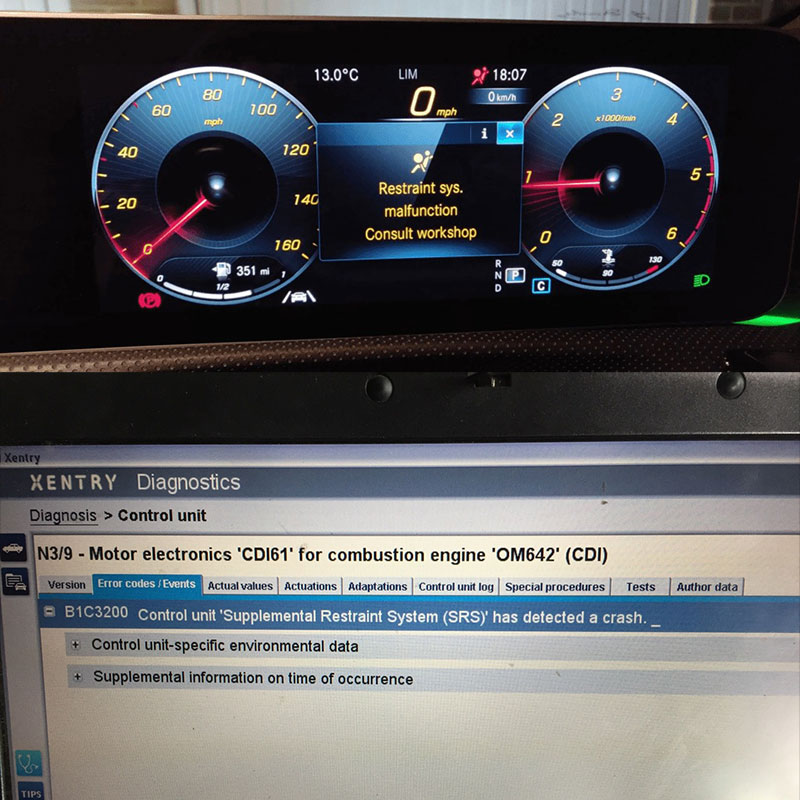
Is Your Audi Showing DTC P0128? Here’s What To Do
Table of Content
- 1. Decoding the P0128 Code on Your Audi
- 1.1. The Significance of P0128 for Audi Vehicles
- 2. What Triggers the P0128 Code in Your Audi?
- 3. Recognizing P0128 Symptoms in Your Audi
- 4. How to Diagnose the P0128 Code on Your Audi
- 5. Repairing the P0128 Code on Your Audi: A Step-by-Step Guide
- 6. Is It Safe to Drive Your Audi with a P0128 Code?
- 7. Expert Tips for Audi P0128 Code Troubleshooting
- 8. Why Choose AutoExplain.com for Your Audi Repair Needs
- 9. Understanding Audi’s Cooling System
- 9.1 Key Components of Audi’s Cooling System
- 9.2 How the Cooling System Prevents Overheating
- 9.3 The Role of the Thermostat in Temperature Regulation
- 9.4 Common Issues Affecting Cooling System Performance
- 10. Frequently Asked Questions About Audi P0128 Code
Is your Audi displaying a P0128 diagnostic trouble code (DTC) and you’re unsure what steps to take? This article breaks down the P0128 code, specifically for Audi vehicles, offering potential causes, symptoms, and diagnostic procedures to help you get your Audi back in top running condition with expert support from AutoExplain.com.
1. Decoding the P0128 Code on Your Audi
What does the P0128 code really mean for your Audi? The P0128 code, labeled as “Coolant Thermostat (Coolant Temperature Below Thermostat Regulating Temperature)”, indicates that your Audi’s engine control module (ECM) has detected that the engine coolant temperature is lower than expected under normal operating conditions. This often occurs when the engine fails to reach its ideal operating temperature efficiently. AutoExplain.com provides remote diagnostic and programming services to help pinpoint the underlying cause and ensure optimal engine performance and temperature control.
1.1. The Significance of P0128 for Audi Vehicles
Why is the P0128 code particularly important for Audi owners? Audi engines are engineered to operate within a precise temperature range for optimal performance and emissions. When the coolant temperature falls below this threshold, the ECM triggers the P0128 code, potentially leading to reduced fuel efficiency, increased emissions, and compromised engine performance. The ECM monitors the coolant temperature sensor, and if the readings are consistently lower than the programmed threshold, the code is set. AutoExplain.com offers expert remote diagnostics to identify issues within your Audi’s cooling system and electrical components, ensuring accurate troubleshooting and efficient repairs.
The P0128 code in Audi vehicles indicates that the engine control module (ECM) has detected that the engine coolant temperature is lower than expected.
2. What Triggers the P0128 Code in Your Audi?
What are the common causes behind the P0128 code in Audi vehicles? Several factors can cause your Audi to display the P0128 code, ranging from simple to more complex issues. Understanding these potential causes is crucial for effective troubleshooting. AutoExplain.com offers advanced diagnostics and repair solutions to address these issues efficiently.
- Faulty Thermostat: A malfunctioning thermostat that is stuck open or opening prematurely is one of the most frequent causes. This prevents the engine from warming up correctly, leading to the P0128 code.
- Low Coolant Level: Insufficient coolant can cause inaccurate temperature readings, triggering the code.
- Coolant Temperature Sensor Issues: A defective coolant temperature sensor or its wiring can send incorrect data to the ECM, resulting in a false P0128 code.
- Faulty Radiator Fan: A cooling fan that runs continuously can overcool the engine, particularly in colder conditions.
- ECM Problems: Though rare, issues within the ECM itself can lead to incorrect interpretation of sensor data.
3. Recognizing P0128 Symptoms in Your Audi
What are the noticeable symptoms of a P0128 error code in your Audi? Being aware of the symptoms associated with the P0128 code is essential for prompt diagnosis and repair. Addressing these symptoms quickly can prevent further complications and maintain your Audi’s performance. AutoExplain.com provides expert guidance to help you recognize and address these symptoms.
- Check Engine Light: The most obvious sign is the illumination of the check engine light on your Audi’s dashboard.
- Reduced Fuel Economy: A cooler-than-normal engine can cause the ECM to adjust fuel delivery, resulting in decreased fuel efficiency.
- Poor Heating Performance: The vehicle’s heating system may not function effectively, blowing cold or lukewarm air, especially in cold weather.
- Engine Takes Longer to Warm Up: The engine may take an extended period to reach its normal operating temperature.
- Fluctuating Temperature Gauge: The temperature gauge may show readings lower than usual or fluctuate erratically.
- Failed Emissions Test: The vehicle may fail an emissions test due to the engine not reaching optimal operating temperature.
4. How to Diagnose the P0128 Code on Your Audi
What steps should you take to diagnose the P0128 code in your Audi? Diagnosing the P0128 code requires a systematic approach to identify the root cause. AutoExplain.com offers remote diagnostic services to help you accurately pinpoint the problem and recommend the appropriate solutions.
- Check the Coolant Level: Verify that the coolant level is adequate and there are no leaks in the cooling system.
- Inspect the Thermostat: Examine the thermostat for any signs of damage or malfunction. A visual inspection may not be sufficient, and a replacement might be necessary for testing purposes.
- Evaluate the Coolant Temperature Sensor: Use a scan tool to monitor the coolant temperature sensor readings. Compare these readings with the actual engine temperature to identify any discrepancies.
- Check the Radiator Fan: Ensure the radiator fan is functioning correctly and not running continuously.
- Use an OBD-II Scanner: Connect an OBD-II scanner to your Audi to confirm the P0128 code and check for any other related codes.
- Review Freeze Frame Data: Analyze the freeze frame data to understand the conditions when the P0128 code was triggered. This data can provide valuable insights into the problem.
- Professional Diagnostic Support: For complex issues, consult with AutoExplain.com for expert remote diagnostic support. Our specialists can provide in-depth analysis and guide you through the diagnostic process.
5. Repairing the P0128 Code on Your Audi: A Step-by-Step Guide
What are the recommended steps to fix the P0128 code on your Audi? Addressing the P0128 code involves targeted repairs based on the diagnostic findings. AutoExplain.com provides comprehensive repair guidance and support to ensure your Audi returns to optimal performance.
- Replace the Thermostat: If the thermostat is faulty, replacing it is usually the most effective solution. Ensure you use a thermostat that meets Audi’s specifications.
- Top Up Coolant: If the coolant level is low, refill it to the correct level. Also, inspect the system for leaks.
- Replace the Coolant Temperature Sensor: If the coolant temperature sensor is defective, replace it with a new one.
- Repair Radiator Fan Issues: If the radiator fan is running continuously, diagnose and repair the fan control system.
- Address Wiring Issues: Inspect and repair any damaged wiring or connections related to the coolant temperature sensor and thermostat.
- ECM Update: If the ECM software is outdated, update it to the latest version. This should be performed by a qualified technician.
- Professional Repair Services: For complex repairs or if you’re not comfortable performing the work yourself, contact AutoExplain.com for remote repair services. Our expert technicians can guide you through the repair process or perform the necessary programming and calibrations remotely.
Replacing a faulty thermostat in an Audi is often an effective solution for resolving the P0128 code.
6. Is It Safe to Drive Your Audi with a P0128 Code?
How safe is it to drive your Audi while the P0128 code is active? Driving with the P0128 code present may not cause immediate damage, but it can lead to long-term issues and reduced performance. AutoExplain.com advises addressing the problem promptly to avoid potential complications.
- Potential Risks: Extended driving with a P0128 code can lead to reduced fuel economy, increased emissions, and potential engine damage due to improper operating temperatures.
- Recommended Action: It’s best to diagnose and repair the issue as soon as possible to prevent further problems and maintain your Audi’s efficiency and reliability.
- Emergency Support: If you’re unsure about the severity of the issue, contact AutoExplain.com for immediate remote diagnostic support. Our experts can assess your situation and provide guidance on whether it’s safe to drive your vehicle.
7. Expert Tips for Audi P0128 Code Troubleshooting
What additional insights can help in troubleshooting the P0128 code on your Audi? Here are some expert tips to consider when diagnosing and repairing the P0128 code on your Audi. AutoExplain.com offers these insights to ensure you approach the issue with the best information possible.
- Use OEM Parts: When replacing components, use original equipment manufacturer (OEM) parts to ensure compatibility and performance.
- Check for Technical Service Bulletins (TSBs): Review Audi’s TSBs for any specific information related to the P0128 code on your model.
- Proper Coolant Mixture: Ensure the coolant mixture is correct to maintain optimal cooling system performance.
- Professional Consultation: If you’re unsure about any step in the diagnostic or repair process, consult with AutoExplain.com for professional guidance.
8. Why Choose AutoExplain.com for Your Audi Repair Needs
Why is AutoExplain.com the best choice for resolving your Audi’s P0128 code and other repair needs? AutoExplain.com stands out as a premier provider of remote diagnostic, programming, and repair services, offering numerous benefits for Audi owners.
- Expert Technicians: Our team consists of highly skilled technicians with extensive experience in Audi vehicles.
- Remote Diagnostic Services: We offer advanced remote diagnostic services to accurately identify the root cause of the P0128 code.
- Programming and Software Updates: We provide ECM programming and software updates to ensure your Audi runs at its best.
- Convenient Remote Support: Our services are delivered remotely, saving you time and money compared to traditional repair shops.
- Comprehensive Support: From initial diagnosis to final repair, we offer comprehensive support to address all your Audi’s needs.
AutoExplain.com is committed to delivering top-notch remote services, ensuring your Audi receives the best possible care. Contact us today to experience the convenience and expertise of our remote diagnostic and repair solutions.
9. Understanding Audi’s Cooling System
How does Audi’s cooling system work and what are its key components? The cooling system in your Audi is vital for maintaining optimal engine temperature, preventing overheating, and ensuring efficient performance. Understanding its components and functionality can help you better diagnose and address issues like the P0128 code. AutoExplain.com provides expert insights into Audi’s cooling systems to support effective troubleshooting.
9.1 Key Components of Audi’s Cooling System
What are the main parts of Audi’s cooling system?
- Radiator: Dissipates heat from the coolant.
- Thermostat: Regulates coolant flow to maintain optimal engine temperature.
- Water Pump: Circulates coolant throughout the engine and cooling system.
- Coolant Temperature Sensor: Monitors coolant temperature and sends data to the ECM.
- Coolant Reservoir: Stores coolant and allows for expansion and contraction due to temperature changes.
- Hoses and Connections: Transport coolant between different components of the cooling system.
9.2 How the Cooling System Prevents Overheating
How does the cooling system in your Audi prevent the engine from overheating? The cooling system’s primary function is to remove excess heat from the engine. The water pump circulates coolant through the engine block, where it absorbs heat. The coolant then flows to the radiator, where the heat is dissipated into the atmosphere. The thermostat regulates this process, ensuring the engine operates within its optimal temperature range.
9.3 The Role of the Thermostat in Temperature Regulation
How does the thermostat work in Audi’s cooling system? The thermostat is a critical component that controls coolant flow based on engine temperature. When the engine is cold, the thermostat remains closed, allowing the engine to warm up quickly. Once the engine reaches its operating temperature, the thermostat opens, allowing coolant to flow through the radiator to prevent overheating.
9.4 Common Issues Affecting Cooling System Performance
What are some common problems that can affect the performance of Audi’s cooling system?
- Leaks: Coolant leaks can reduce the system’s efficiency and lead to overheating.
- Clogged Radiator: Debris and corrosion can clog the radiator, reducing its ability to dissipate heat.
- Faulty Water Pump: A malfunctioning water pump can disrupt coolant circulation, causing overheating.
- Stuck Thermostat: A thermostat stuck in the open or closed position can lead to temperature regulation issues.
- Air Pockets: Air trapped in the cooling system can reduce its efficiency.
10. Frequently Asked Questions About Audi P0128 Code
Have more questions about the P0128 code and how it affects your Audi? Here are some frequently asked questions to help you better understand the issue and its solutions. AutoExplain.com provides these FAQs to offer additional clarity and support.
-
What does the P0128 code mean for my Audi?
The P0128 code indicates that your Audi’s engine coolant temperature is below the thermostat regulating temperature, which can affect engine performance and fuel efficiency.
-
Can a low coolant level cause the P0128 code?
Yes, a low coolant level can lead to inaccurate temperature readings and trigger the P0128 code.
-
How do I check the coolant level in my Audi?
Refer to your Audi’s owner’s manual for the location of the coolant reservoir and instructions on how to check the coolant level.
-
Is it necessary to replace the thermostat if I get a P0128 code?
If the thermostat is found to be faulty during the diagnostic process, replacing it is often necessary to resolve the P0128 code.
-
Can a faulty coolant temperature sensor cause the P0128 code?
Yes, a defective coolant temperature sensor can send incorrect data to the ECM, resulting in a false P0128 code.
-
What is the role of the radiator fan in the cooling system?
The radiator fan helps dissipate heat from the coolant, preventing the engine from overheating, especially when the vehicle is stationary or moving slowly.
-
How can I diagnose the P0128 code myself?
You can use an OBD-II scanner to confirm the P0128 code and check for any other related codes. Additionally, you can inspect the coolant level, thermostat, and coolant temperature sensor.
-
Is it safe to drive my Audi with a P0128 code?
Driving with a P0128 code may not cause immediate damage, but it can lead to long-term issues and reduced performance. It’s best to diagnose and repair the issue as soon as possible.
-
Can AutoExplain.com help me diagnose and repair the P0128 code remotely?
Yes, AutoExplain.com offers expert remote diagnostic and repair services to help you accurately identify the root cause of the P0128 code and provide the necessary solutions.
-
How do I contact AutoExplain.com for remote support?
You can contact AutoExplain.com via WhatsApp at (+84)967469410 or email at [email protected]. Visit our website at AutoExplain.com for more information.
Experiencing the P0128 code on your Audi can be concerning, but with the right knowledge and resources, you can address the issue effectively. By understanding the causes, symptoms, and diagnostic steps, you can ensure your Audi remains in optimal condition. For expert remote support and comprehensive solutions, trust AutoExplain.com to guide you through the repair process and keep your Audi running smoothly. Contact us today to experience the convenience and expertise of our remote diagnostic and repair services. Our office is located at 1500 N Grant ST Sten Denver, CO 80203.

65535 Audi Fault Code: Expert Solutions and Fixes
Audi A3 Trouble Code 00796: Diagnosis, Solutions, and Expert Insights
Audi DTC 16347:014 – Expert Diagnosis and Solutions

Josh William
Josh William is a seasoned automotive expert and technical writer at AutoExplain. With a background as an automotive technician, he brings hands-on experience and deep industry knowledge to his writing.



